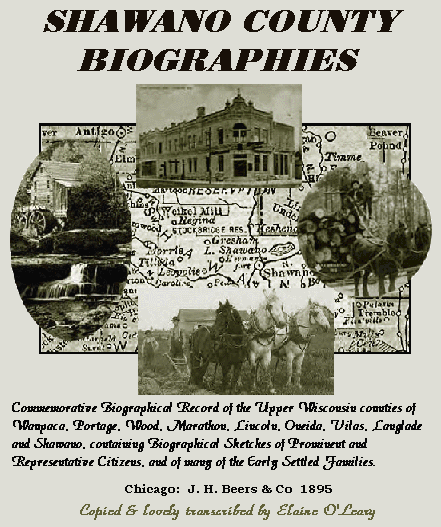
Pages 382-3
MATHIAS WAGNER was born March
22, 1852, in Kempfeld. Prussia, in the Rhine Province of Germany, and is
a son of Frederick and Elizabeth (Neisus) Wagner. The father was a weaver
by trade, and thus supported his family, which numbered eleven sons and
one daughter. The parents both died in their native land. Our subject,
who is the youngest child in the family, attended the public schools until
fourteen years of age, when he began learning the trade of a brewer, which
he followed for one year and eleven months. He then concluded to give up
the business and come to the United States, where he hoped to better his
financial condition and secure a good home. He had already saved some money,
but being in his minority could not get possession of it, so his foreman
advanced him the necessary sum, taking his back wages as security.
On April 22, 1868, Mr. Wagner bade good-by to home and friends,
and from Liverpool took passage on a steamer bound for New York, where
he arrived sixteen days later. Washington county, Wis., was his destination,
his two brothers, William and Philip, being located there. At Young
America he worked at the blacksmith's trade for two years, learning the
business. When he arrived here he had no capital, save a strong heart and
a pair of willing hands, and could not speak a word of English. When he
had learned the business he followed blacksmithing a year, and upon the
death of his brother William he found himself in charge of the shop. He
remained in Young America until 1873, and then went to Milwaukee, where
he worked at his trade in the ship shops for some six months, removing
then to Barton, Washington county, where his brother Philip had located
in the meantime. There he was employed until 1874, when he went to Peoria,
Ill., and carried on blacksmithing until April, returning then to Barton.
The Chicago & North Western railroad had just been completed, and looking
for a favorable opening along its line, Mr. Wagner at length bought a lot
and built a smithy at Fond du Lac. He had no capital, but his credit was
good, and he was even forced to borrow $5 to buy his tools. For over four
years he successfully conducted his shop there.
During this time Mr. Wagner was married in Campbellsport, Wis.,
July 22 1876, to Miss Mary Meyer, who was born in Fond du Lac county, daughter
of Philip Meyer, a farmer. In 1878 he sold out and removed his family to
Bonduel, Shawano county, where he has since successfully engaged in business.
The home of Mr. and Mrs. Wagner has been blessed with nine children:
Annie (who is serving as postmistress at Bonduel), Matilda, Mathias, Adolph,
Willie and Mary, at home; Christian, who died in infancy; Oscar at home;
and Arthur, who died at the age of two and a half years. In 1880 Mr. Wagner
erected a tasty and commodious brick residence near his shop, and there
lived happily until November 28, 1894, when his elegant home, his barn,
blacksmith shop, wagon shop and wood shed were all destroyed by fire, causing
a loss of about seven thousand dollars. Thus the accumulated
savings of many years were swept away within a few minutes. Many another
man of less resolute purpose would have been discouraged, but with the
same cheerful and courageous spirit that has always characterized him,
Mr. Wagner began to rebuild and to retrieve, his lost possessions. In 1890,
in partnership with Theo Meyer, he built a steam flouring-mill in which
he still retains an interest. He is a man of good business and executive
ability, and by his fair and honorable dealing has won a reputation of
which he may be justly proud.
Politically, Mr. Wagner has always been a Democrat, and a stanch
supporter of the party principles. He was appointed post-master, at Bonduel,
and the building erected purposely to serve as an office was destroyed
by fire with his other property. He then erected the one in which the post
office is now located. He has for some time served as school director,
and takes a deep interest in everything pertaining to the advancement of
the case of education, but has declined all other offices, preferring to
give his time and attention to his business. He and his wife are
members of the Lutheran Church, Mr. Wagner being leader of the choir. |